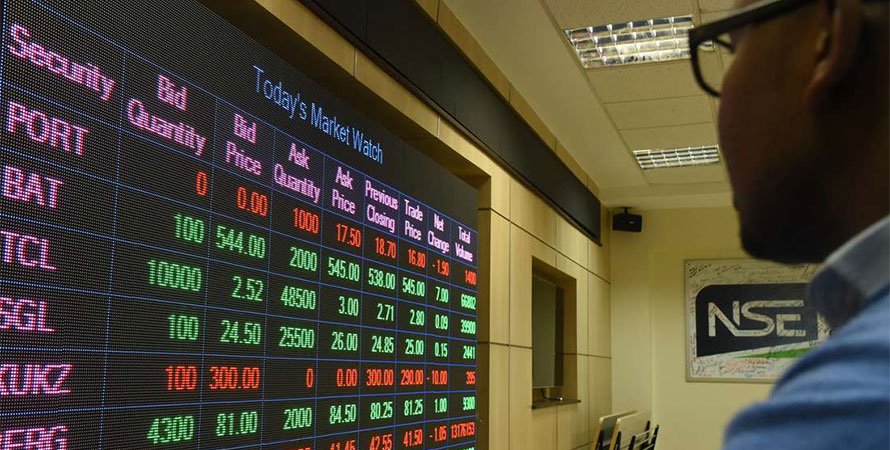The Nairobi Securities Exchange trading floor. FILE PHOTO | NMG The shilling dipped against the dollar while the Nairobi Securities Exchange lost Sh110 billion in the week Kenya announced a phased reopening of the country from Covid-19 lockdown to stimulate the economy.
The value of all the stocks on the Nairobi bourse hit a three-month low of Sh2.02 trillion on Friday compared to Sh2.13 trillion on July 3 – ahead of the market factoring in news on the easing of the restrictions.
Analysts linked the NSE dip to foreign investors’ reduced interest in blue-chip stocks, arguing that most traders were fretting over the performance of market movers like Safaricom and the big banks.
The high-net worth traders believe the effects of coronavirus will dim the earnings power of Safaricom’s M-Pesa and banks, says Sarah Wanga, head of research at AIB Capital, arguing that the investors are less optimistic of a quick turnaround with the reopening.
But merchandise importers and multinational companies stepped up purchase of dollars to meet obligations following the phased reopening amid the reduced inflows of hard currency, currency traders said.
This saw the shilling close the week at Sh107.10 to the dollar, compared with Sh106.61 on July 3 — moving above Sh107 for the first time since May 28.
Local traders expect the easing of travel restrictions and resumption of flights announced on July 6 to increase demand for products, triggering the need to import finished goods like cars and clothing and raw materials for businesses that have, since April, faced reduced cash flow.
President Uhuru Kenyatta on July 6 ended the cessation of movement in and out of Nairobi, Mombasa and Mandera.
He also allowed domestic commercial and passenger flights to resume operations on July 15 while international travel returns on August 1 in efforts expected to ease the pain of Covid-19 on the economy.
The pandemic has battered the economy and delivered mass jobs cuts with the Treasury projecting growth to slow to 2.5 percent this year from 5.4 percent last year.
But foreign investors who drive the NSE are less optimistic on the reopening of the economy, changing the fortunes of blue-chip firms like Safaricom, Equity Group , KCB Group , Cooperative Bank and East Africa Breweries Limited .The five counters influence the Nairobi bourse and account for nearly 80 percent of the value of all stocks on the NSE. FOREIGN INVESTORS “Foreigners increased their net selling in the week. There is concern […]
